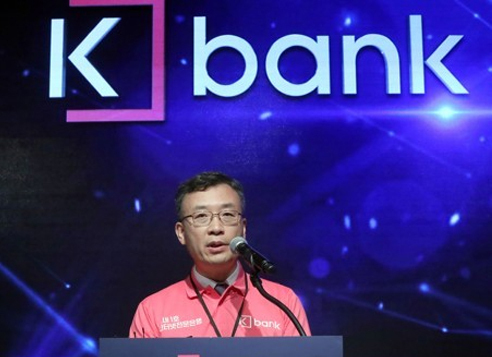K bank, South Korea’s first online-only bank, has come under financial pressure over its failure in capital increase through issuing new stocks, as pledged in May.
By Thursday, K bank shareholders were scheduled to buy 24 million newly issued common stocks and 6 million convertible preferred stocks without voting rights, worth a combined 150 billion won ($132.4 million).
Of the total pledges with 5,000 won per share, only 30 billion won for the convertible securities purchase had been paid in by the deadline, from the three-biggest shareholders -- Woori Bank, KT Corp. and NH Investment & Securities. K bank officials said it would confirm a renewed deadline for the paid-in capital increase for the rest of the shareholders in the near future.
 |
(Yonhap) |
This would pose an impasse to the future business of the online-only bank owned by 20 shareholders. K bank’s total capital amounted to 380 billion won as of Sunday, while its BIS capital adequacy ratio, a measure of a bank’s available capital and insolvency risk, dropped by 4.67 percentage points in the first quarter of 2018 to 13.48 percent. A plan to launch its first mortgage loan products by the second quarter this year has been postponed.
Launched in April 2017 with 250 billion won in capital, K bank carried out a 100 billion-won capital hike in September, but shares worth some 20 billion won were unclaimed from seven shareholders then.
However, the de facto major shareholder telecommunication company KT cannot solely take part in purchasing common stocks on its own due to a regulation in place.
Under the Banking Act, a nonfinancial company is barred from holding more than 10 percent -- either with or without voting rights -- of a banking firm. While Woori Bank owns 13.2 percent of K bank, KT holds 10 percent of shares. To increase KT’s share, the purchase of newly issued common shares by other shareholders must be involved to maintain KT’s 10 percent ceiling. K bank shareholders include NH Investment & Securities with 10 percent, Hanwha Life Insurance with 9.41 percent and GS Retail with 9.26 percent.
This comes in contrast to Kakao Bank, where major shareholder Korea Investment Holdings is a financial services provider and is exempt from the banking regulation. Korea Investment Holdings own 58 percent of the mobile-only bank, in part contributing to Kakao Bank’s combined 1 trillion-won capital rise as of Sunday.
K bank in the first quarter of 2018 logged 18.8 billion won in net losses, showing lackluster performance improvement compared to 2017. The bank recorded a yearly net loss of 83.8 billion won in 2017 after its launch in April.
Kakao Bank recorded 5.3 billion won net loss in the first quarter of 2018, but it has eight times more customers and six times larger outstanding deposit volume compared to K bank, as of the end of last month.
By Son Ji-hyoung
(
consnow@heraldcorp.com)





![[Weekender] Korea's traditional sauce culture gains global recognition](http://res.heraldm.com/phpwas/restmb_idxmake.php?idx=644&simg=/content/image/2024/11/21/20241121050153_0.jpg)


